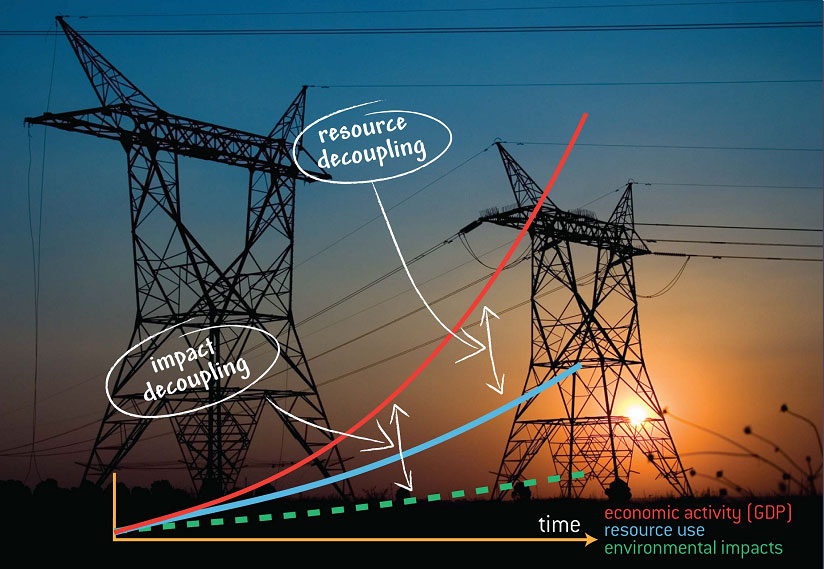
| introduction |
| background |
| role of cities |
| SA and the GCR |
| green initiatives |
| food |
| solar energy |
| energy efficiency |
| CSP |
| water and sanitation |
| waste |
| mobilising the region |
| can the success of green initiatives be measured? | |
 |
|
if we invest in green technologies, can we measure the success of our initiatives? |
|
| The success of green initiatives can be assessed through measuring how ‘decoupled’ the economy becomes from resource use and environmental impacts. | |
Resource decoupling refers to decoupling the rate of consumption of primary resources from economic activity, which is equivalent to ‘dematerialisation’.
It implies using less material, energy, water and land resources for the same economic output. If there is resource decoupling, there is an increase in resource productivity, or an increase in the efficiency with which resources are used. |
|
Resource productivity can usually be measured unequivocally. Expressing resource productivity for a national economy, an economic sector, or even for a certain economic process or production chain looks like this: |
|
|
|
There’s another way to demonstrate resource decoupling – comparing the gradient of economic output across time with the gradient of resource input – if the latter is smaller, there is resource decoupling. |
|
 |
|
| Swilling, M. and Fischer-Kowalski, M. (2010) 'Decoupling and Sustainable Resource Management: Towards a Conceptual Framework'. Paris: International Panel for Sustainable Resource Management, United Nations Environment Programme | |
| By contrast: | |
| Impact decoupling refers to the relation between economic output and environmental impacts. | |
Environmental impacts are associated with:
Methodologically, these impacts can be estimated by life cycle analysis in combination with various input-output techniques. If environmental impacts become dissociated from added value in economic terms, there is impact decoupling. JUST A NOTE OF CAUTION: On aggregate system levels such as a national economy or an economic sector, it is methodologically very demanding to measure impact decoupling, because there is a whole number of environmental impacts to be considered, their trends may be quite different and system boundaries as well as weighting procedures are contested. Swilling, M. and Fischer-Kowalski, M. (2010) ' Decoupling and Sustainable Resource Management: Towards a Conceptual Framework'. Paris: International Panel for Sustainable Resource Management, United Nations Environment Programme |
|
what really matters in the short-term, though? While decoupling provides a measurement tool at a high level, what’s important is the implementation of greening activities across a wide range of key areas. |
|

